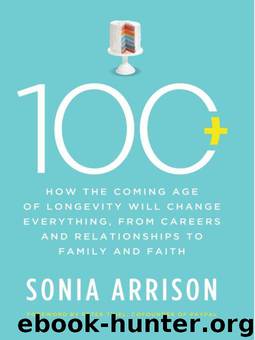100 Plus: How the Coming Age of Longevity Will Change Everything, From Careers and Relationships to Family and by Arrison Sonia

Author:Arrison, Sonia [Arrison, Sonia]
Language: eng
Format: epub
ISBN: 9780465027705
Publisher: Basic Books
Published: 2011-08-22T21:00:00+00:00
THE VALUE OF TIME
Time-use scholars Dr. John P. Robinson and Dr. Geoffrey Godbey note that, although leisure time has increased, regular surveys over the last thirty years have shown that American adults feel rushed either all the time or some of the time.2 Perhaps surprisingly, even with the graying of the nation and the number of retirees increasing, this pattern hasn’t changed during all these years. For example, in 1971 73 percent of all Americans reported feeling either “always” or “sometimes rushed.”3 In 2005 the numbers were similar, with 76 percent saying they were “always” or “sometimes” rushed.4 This feeling of time pressure results in humorous articles with titles like “Too Busy to Notice You’re Too Busy.” On a more serious level, however, our feelings of busyness are inherently linked with both economic growth and how much time we have. These two factors also happen to be significantly affected by life span.
In 1965 Nobel laureate Gary Becker wrote a paper titled “A Theory of the Allocation of Time,” discussing how time constitutes a significant part of the true cost of anything. The insight of the paper suggests that the cost of time changes based on the nature of a commodity and the length of time under consideration. For instance, the cost of time is less for activities like sleeping and eating as compared with going to the theater because sleeping and eating contribute to a person’s productive effort. That is, people can’t really do anything else if they are weak from sleep or food deprivation. In addition, he argued that “the cost of time is often less on weekends and in the evenings because many firms are closed then.”5 The idea that the cost of time changes depending on circumstances could have great implications for a world in which people gained more time, a world where humans expanded their life expectancy by a factor of two.
Becker wasn’t the only one to realize that the price of time changes. In an insightful little book titled The Harried Leisure Class, Swedish economist Staffan Linder explains why, even with the great economic growth Western nations have experienced, individuals don’t seem to be more relaxed. In fact, as the preceding polling data attest, most of us seem rather harried. It turns out that economic growth also changes how we spend our time. As wages go up (and time stays fixed), it becomes more expensive to do things away from work. Consuming things like movies or books takes time that we might have otherwise spent working, so increasing wages makes our nonwork time more expensive.6
Both Becker and Linder logically assumed fixed amounts of time. There are only 24 hours in a day, after all, and life expectancy in 1965 was about 70 years.7 Out of 24 hours, if we assume 8 are spent sleeping, that means only 16 are left for work and nonwork activities. So if we multiply 16 by 365 days in a year by 70 years, that means the average person in 1965 had 408,800 hours during his life in which to do things.
Download
This site does not store any files on its server. We only index and link to content provided by other sites. Please contact the content providers to delete copyright contents if any and email us, we'll remove relevant links or contents immediately.
When Breath Becomes Air by Paul Kalanithi(7264)
Why We Sleep: Unlocking the Power of Sleep and Dreams by Matthew Walker(5642)
Paper Towns by Green John(4169)
The Immortal Life of Henrietta Lacks by Rebecca Skloot(3826)
The Sports Rules Book by Human Kinetics(3588)
Dynamic Alignment Through Imagery by Eric Franklin(3489)
ACSM's Complete Guide to Fitness & Health by ACSM(3469)
Kaplan MCAT Organic Chemistry Review: Created for MCAT 2015 (Kaplan Test Prep) by Kaplan(3423)
Introduction to Kinesiology by Shirl J. Hoffman(3301)
Livewired by David Eagleman(3123)
The River of Consciousness by Oliver Sacks(2992)
Alchemy and Alchemists by C. J. S. Thompson(2912)
The Death of the Heart by Elizabeth Bowen(2901)
Descartes' Error by Antonio Damasio(2732)
Bad Pharma by Ben Goldacre(2730)
Kaplan MCAT Behavioral Sciences Review: Created for MCAT 2015 (Kaplan Test Prep) by Kaplan(2492)
The Gene: An Intimate History by Siddhartha Mukherjee(2491)
The Fate of Rome: Climate, Disease, and the End of an Empire (The Princeton History of the Ancient World) by Kyle Harper(2436)
The Emperor of All Maladies: A Biography of Cancer by Siddhartha Mukherjee(2431)
